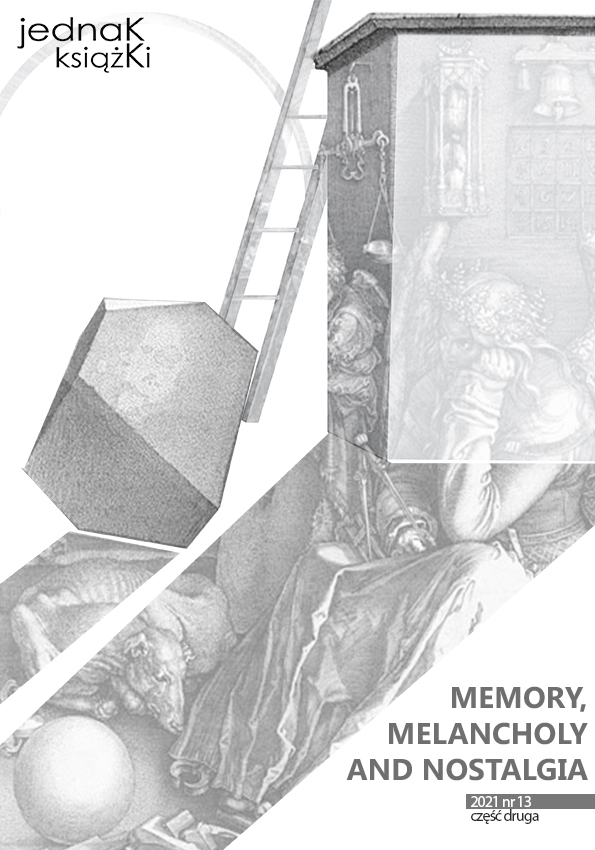Loss, Longing, and Desire: The Poetics of Nostalgia in Qurratulain Hyder’s "My Temples, Too"
DOI:
https://doi.org/10.26881/jk.2021.13.07Słowa kluczowe:
Qurratulain Hyder, nostalgia, longing, desire, Partition of IndiaAbstrakt
“Nostalgia,” writes Svetlana Boym, often emerges in times of “historical upheavals” or when the “rhythms of life” are suddenly “accelerated.” One can well understand that such nostalgic outbreaks are the results of the experience change. One such moment was that of the Partition of India in 1947. This paper focuses on this moment as it is depicted in Qurratulain Hyder’s novel, My Temples, Too. Hyder’s novel, that centers around the experience of Partition, is haunted by a palpable sense of loss, of rupture, and an acute longing for the places and spaces of the past that its characters witness as eroding. Following scholars like Boym, Linda Hutcheon, De Brigard, Gaston Bachelard, Edward Casey, and others, this paper first prepare the ground of its argument by showing how memory and nostalgia are often deeply rooted in everyday things, objects, and places of habitation, investing them with a sense of belonging. Thereafter, it situates Hyder’s novel in its immediate context and explores its poetics of loss, longing, and nostalgia.
Downloads
Bibliografia
Anjum Naila. 2016. “Questioning Partition’s Rationale: Qurratulain Hyder’s ‘My Temples, Too.’” Indian Literature 60, no. 3: 138–53. Accessed February 20, 2021. http://www. jstor.org/stable/44479013.
Bachelard Gaston. 1994. The Poetics of Space. Jolas Maria, trans. Boston: Beacon Press.
Bakhtin Mikhail. 1981. Forms of Time and of the Chronotope in the Novel. In: The Dialogic Imagination, 84–258.
Emerson Caryl, Holquist Michael, trans. Austin: University of Texas Press.
Basso Keith H. 1996. Wisdom Sits in Places: Notes on a Western Apache Landscape, 53–90. In: Feld Steven, Basso Keith H., eds. Senses of Place. Santa Fe, New Mexico: School of American Research Press.
Boym Svetlana. 2001. The Future of Nostalgia. New York: Basic Books. Bridard Felipe De. 2018. Nostalgia and Mental Simulation, 155–182. In: Gotlib Anna, ed. The Moral Psychology of Sadness. London, New York: Rowman & Littlefield.
Butalia Urvashi. 2017. The Other Side of Silence: Voices from the Partition of India. India: Penguin Random House.
Casey Edward S. 1996. How to Get from Space to Place in a Fairly Short Stretch of Time: Phenomenological Prolegomena, 13–52. In: Feld Steven, Basso Keith H., eds. Senses of Place. Santa Fe, New Mexico: School of American Research Press.
Farooqui Mahmood. 2007. “Aini Apa.” Online: https://kafila.online/2007/09/06/aini-apa/. Accessed February 20, 2021.
Feld Steven. 1996. Waterfalls of Song: An Acoustemology of Place Resounding in Bosavi, Papua New Guinea, 91–134. In: Feld Steven, Basso Keith H., eds. Senses of Place. Santa Fe, New Mexico: School of American Research Press.
Frank Andrew I. 2005. Sense of Place, 590–591. In: Caves Roger W., ed. Encyclopedia of the City. London and New York: Routledge.
Gopal Priyamvada. 2009. The Indian English Novel: Nation, History, and Narrative. New York: Oxford University Press.
Heidegger Martin. 1971. Building Dwelling Thinking, 141–160. In: Poetry, Language, Thought. Hofstadter Albert, trans. New York: Harper Perennial.
Hobsbawm Eric, Ranger Terence. 1992. The Invention of Tradition. New York: Cambridge University Press.
Hosain Attia. 2009. Sunlight on a Broken Column. India: Penguin Random House.
Hua Anh. 2005. Diaspora and Cultural Memory, 191–208. In: Agnew Vijay, ed. Diaspora, Memory, and Identity: A Search for Home. Toronto, Buffalo, London: University of Toronto Press.
Hutcheon Linda,Valdés Mario. 1998. “Irony, Nostalgia, and the Postmodern: A Dialogue.” Poligrafias, Revista de Literatura Comparada 3: 18–41. Accessed February 20, 2021. Online: https://www.semanticscholar.org/paper/Irony%2CNostalgia%2C-and-the-Postmodern%3A-A-Dialogue-Hutcheon-Valde%CC%81s/ b7611bc0bfe9cdae867457f779851410784af298.
Hyder Qurratulain. 1999. A Season of Betrayals: A Short Story and Two Novellas. New Delhi: Kali for Women.
Hyder Qurratulain. 2018. My Temples, Too. Hyder Qurratulain, trans. New Delhi: Speaking Tiger and Women Limited. Kindle.
Pandey Gyanendra. 1997. “Partition and Independence in Delhi: 1947–48.” Economic and Political Weekly 32 (36): 2261–272. Accessed February 20, 2021. Online: http://www. jstor.org/stable/4405816.
Rajan Rajeswari Sunder. 2014. “Zeitgeist and the Literary Text: India, 1947, in Qurratulain Hyder’s My Temples, Too and Salman Rushdie’s Midnight’s Children.” Critical Inquiry 40 (4): 439–65. Accessed February 20, 2021. doi:10.1086/676415.
Ray Sangeeta. 2000. En-Gendering India: Woman and Nation in Colonial and Postcolonial Narratives. Durham and London: Duke University Press.
Thapar Romila. 2014. The Past as Present: Forging Contemporary Identities Through History. New Delhi: Aleph Book Company. Ugrešić Dubravka. 1996. “The Confiscation of Memory.” Online: https://newleftreview.org/ issues/i218/articles/dubravka-ugresic-the-confiscation-of-memory. Accessed February 20, 2021.
Upadhyaya Priyankar. 2011. Communal Peace in India: Lessons from Multicultural Banaras, 83–95. In: Warikoo K., ed. Religion and Security in South and Central Asia. London and New York: Routledge.

 Uniwersyteckie Czasopisma Naukowe
Uniwersyteckie Czasopisma Naukowe





